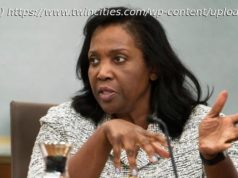Democrats are happy to say President Donald Trump undermined American democracy. That he patted Vladimir Putin on the back for interfering in U. S. elections. That he’s being blackmailed by Russia.
WASHINGTON — Democrats are happy to say President Donald Trump undermined American democracy. That he patted Vladimir Putin on the back for interfering in U. S. elections. That he’s being blackmailed by Russia.
But that he committed treason? That’s too far for some leading Democrats worried about sending the wrong message during an election year.
« The bottom line is, different people will characterize it differently, » Senate Democratic leader Chuck Schumer told reporters this week of Trump’s conduct toward Russia. He slammed Trump in every way but that one, accusing him of weakness and lame and contradictory walk backs. « President Trump undercut our intelligence, elevated a brutal dictator who’s taking advantage of the United States. And maybe, most importantly, refused to confront President Putin. »
A debate has raged in Democratic circles this week over how strongly to condemn Trump’s comments in Helsinki, where, standing by Putin’s side, the U. S. president refused to say he believed American intelligence over Putin’s denials about Russian election interference. Trump later sought to walk back his stance, saying he misspoke using a double negative.
There was a burst of condemnation in the 48 hours after Trump’s performance that elevated the discussion of « treason » by a president to a level not seen in generations. Former CIA Director John Brennan, who has worked in both Democratic and Republican administrations, quickly tweeted that Trump’s conduct in Helsinki was « nothing short of treasonous. » Rep. Bonnie Watson Coleman, D-N. J., used #TreasonSummit in her post about the meeting. Protesters gathered in front of the White House on Tuesday chanted, « Traitor! Traitor! Traitor! »
But Democratic leaders, along with some activists and strategists, warn that such rhetoric could backfire.
Trump responded Wednesday by casting his critics as victims of « Trump Derangement Syndrome, » a term coined to describe a fury so deep it renders the afflicted blind to the president’s accomplishments. It’s a theme he’s set out before, when he labeled critical comments by Democratic women « crazy rants » and other unflattering analysis as « hysterical. » And it’s designed to undermine the Democrats’ midterm election argument that they can govern more steadily than the Republican majorities of the House and Senate.
The legal definition of treason is providing « aid and comfort » to enemies of the U. S., a high crime. If Democrats align behind the term, it raises the question of what they plan to do about it. The party, according to two congressional aides who spoke on condition of anonymity because they were not authorized to discuss strategy, doesn’t have an answer.
The language also risks alienating swing voters who don’t appreciate over-the-top rhetoric. After all, treason is a crime so serious that the convicted can be executed.
Polls taken before the Helsinki summit suggest the public is split over how each party is treating Trump. A Washington Post-Schar School poll conducted in late June and early July found that nearly half of registered voters — 48 percent — think Democrats running for Congress have been too critical of Trump. Forty-four percent think Democrats are striking the right balance and 7 percent think they’ve been too supportive.
Other strategists say Democrats generally are better off backing special counsel Robert Mueller’s investigation of whether Trump or his associates colluded with Russia to influence the 2016 elections in Trump’s favor.
« I’m not sure it’s going to be beneficial to get into a political argument over whether Trump’s behavior meets the legal standard of treason, » said Democratic pollster Geoff Garin. « What’s important about this is it burnishes other things that people worried about regarding Trump, including how he is focused always on what’s in it for him as opposed to what’s in it for the country. That’s a framework that applies to a whole host of things Democrats can be talking about between now and the election. »
Jim Kessler, the senior vice president for policy at Third Way, a think tank that backs center-left ideas, said Democrats are « getting toward 100 percent unity between likely Democratic and swing voters that the Mueller investigation must go forward in full force. »
Michael Avenatti, the outspoken lawyer for adult-film actress Stormy Daniels who is suing Trump, said he deliberately did not use the word « treason » or « traitor » when he spoke at the White House protest Tuesday night.
« The reason why I did not use that word is because it may be a bridge too far, » Avenatti said Wednesday in a telephone interview. « My role revolves around evidence and facts that then lead me to conclusions. And I don’t have yet enough facts and evidence to use the word ‘treason.' »
But not all Democrats see the treason charge as necessarily harmful to their election-year prospects. Indeed, there’s evidence of some ambivalence. Though Watson Coleman used the #TreasonSummit hashtag, she has chosen not to say the word in public yet, her spokeswoman said.
And Rep. Jan Shakowsky, D-Ill., was the only one of 10 Democrats at a Tuesday news conference on Trump’s Helsinki summit to mention the word « treason. » But even she didn’t directly accuse Trump of that offense. Instead, she thanked Brennan for « using the word that is starting to pop up now, and that word is treason. » She noted that her own statement said Trump’s conduct « borders on treason. »
Neera Tanden, president of the Center for American Progress, called Trump a « traitor » at Tuesday’s protest in front of the White House.
« I believe that (Trump’s) behavior is commonly understood as treasonous, » said Tanden, who served as policy aide to President Barack Obama.
And several Democrats quoted Brennan’s statement.
« I agree with John Brennan, who said that it was ‘nothing short of treasonous,' » House Democratic Whip Steny Hoyer told reporters Wednesday.






